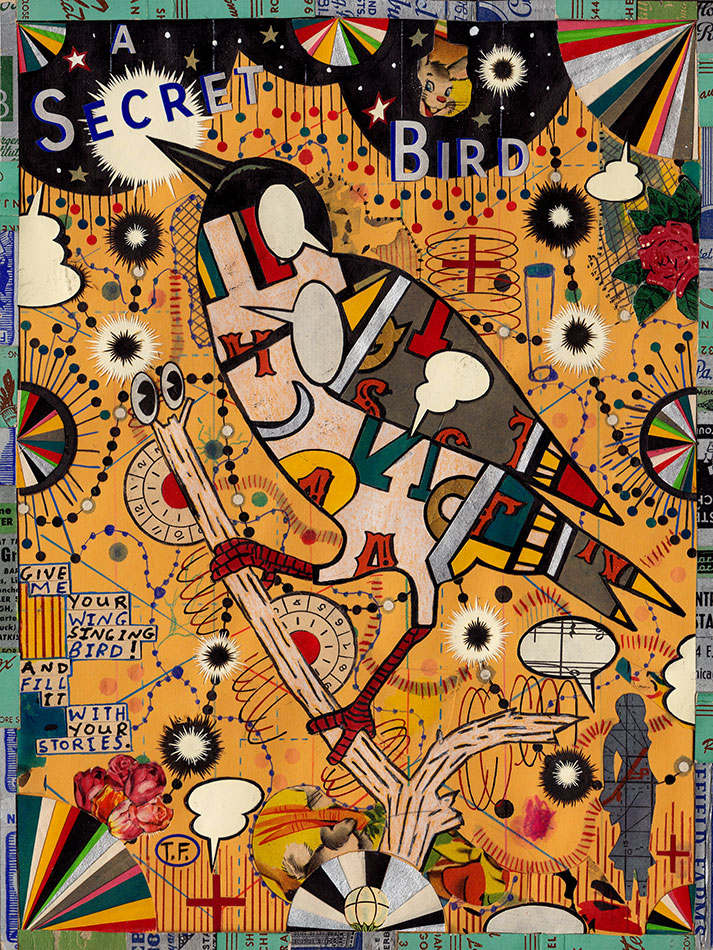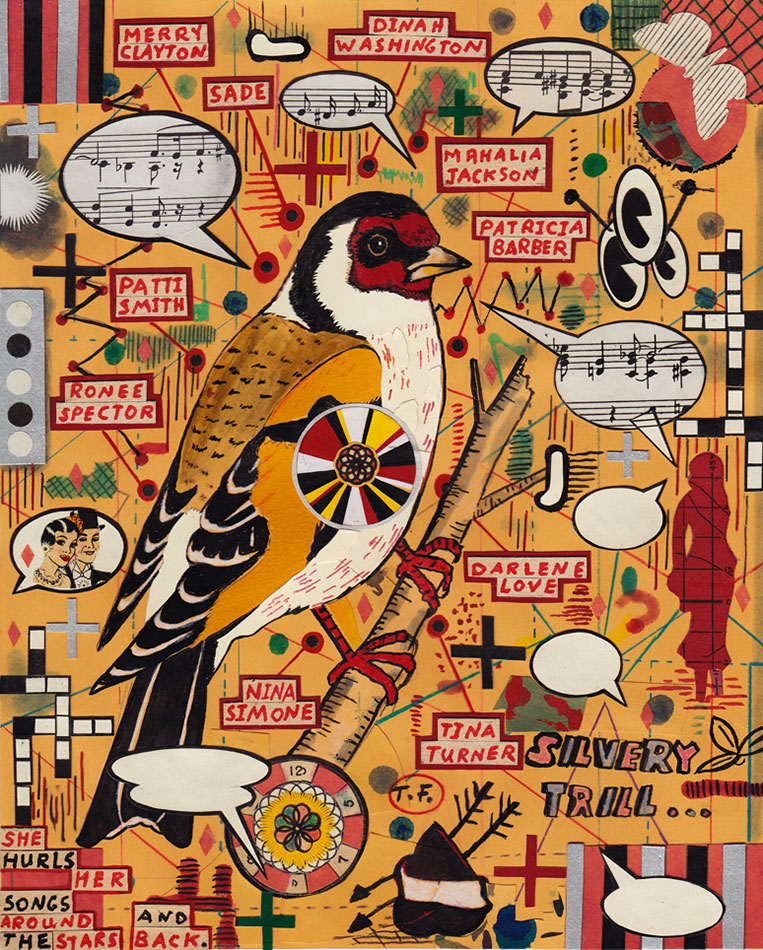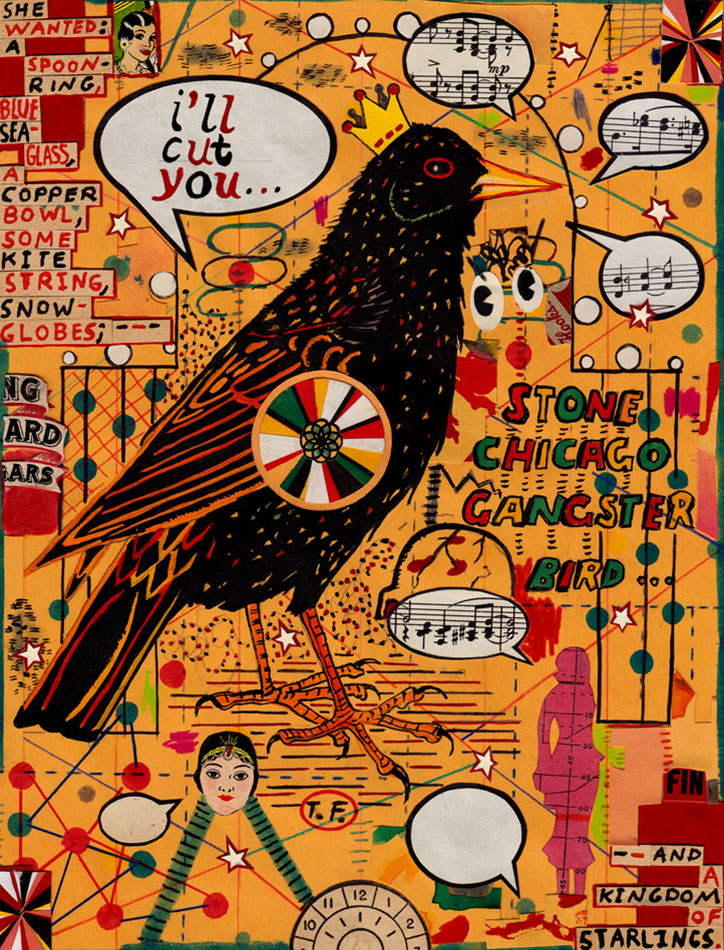The Poetry Foundation exhibited Tony Fitzpatrick’s final show of drawings before he left Chicago for New Orleans. The work interlaces poetry, ephemera, and his institutional memory of the city itself: “a bird made from bright planets.”
Here Tony Fitzpatrick shares his stories of the birds that inspired these drawings.
“In the beginning there was birds, always. They were the first things I ever drew.
“... [my grandmother would] hold her finger to her lips and say, ‘Shut up and listen.’
“And I began to hear it, right about sunrise: the birds are hungry. And if you have a feeder, they’ll be making noise. And I learned that a blackbird song is different from the song of the house finch. A mourning dove had a low, mournful coo; sparrows and chickadees, just high, trill-y kind of songs.
“But you put all of it together and you have this music. And my grandmother said to me, ‘You see, for a piece of bread, you can hear God sing.’”
In the beginning there was birds, always. They were the first things I ever drew. When I was a kid, I went to a Catholic school. In fact, I went to six or seven Catholic schools. I kept running into differences of opinions with nuns and the Christian brothers. And when I was in third grade they sent me to the shrink because I kept drawing birds with women’s heads and drawing women with bird heads.
I could read by the time I was five years old. My mother did not like television; we didn't have one in the house until I was about ten or eleven so my dad could watch the Sox games. My mother thought television was lazy and not very bright and made for a lazy mind. So she always gave things to draw with [and] books to read, including Poetry magazine; it was always in our house. My mother wrote poetry. She gave it up after she got married to my father.
So I would always draw. My mother worked third shift at a Pepperidge Farm and she would bring home these long pieces of paper that they would blot the breads on after they came out of the oven.
And she would say, “Tony, make me a picture.”
And because I loved comics, I would draw the picture kind of sequentially. All my characters were some variation of birds.
By the time I got finished drawing the picture, she’d say, “Now, write me the story.”
And that’s kind of how it all started.
When I was six my father had a heart attack and my grandmother, May, came to live with us. I’m one of eight children, so my mother kind of needed a whip and a chair to keep everybody in line. She knew we’d never misbehave for our grandmother.
Every morning my grandmother would get up and toast a couple of pieces of bread and break them up, sometimes even put jam on them, and she’d throw them out into the backyard for the birds. And this was unfathomable to me. We were forbidden not to finish what was on our plate. We thought that throwing food away was a sin. My father would constantly remind me that there were people in Biafra and India starving for this food.
So my grandmother throwing two pieces of bread out the back window just seemed counterintuitive to me. And I said, “Grandma, why are you giving our bread to the birds?”
She'd look out the window and she'd hold her finger to her lips and just [say] ”Shut up and listen.“ And she'd open the window a little bit and she’d say, ”Now listen.“
And I began to hear it, right about sunrise: the birds are hungry. And if you have a feeder, they’ll be making noise. And I learned that a blackbird song is different from the song of the house finch. A mourning dove had a low, mournful coo; sparrows and chickadees, just high, trill-y kind of songs.
But you put all of it together and you have this music. And my grandmother said to me, “You see, for a piece of bread, you can hear God sing.”
And I never forgot that.

“As it ascended, it just grazed my face. And I looked up, and the sun was shining and I couldn’t see it. And to my mind the finch, this little bird, had just become part of the sun. It had just flown up and become this intractable part of the sun.
“And I like to think this—all these drawings and all this writing, that I’ve been looking for him ever since.”
My father used to make us pick all the dandelions out of the backyard. I never understood it; I always thought they were beautiful.
You know that if there were only ten of them left in the world, millionaires would be paying billions of dollars to own one. But my father could not stand the dandelions, thought they made us look like—look like shanty Irish or hillbillies. So he’d send me out in the backyard with a bag from the Jewel. And we had a huge backyard, so it would take me most of a day to pick all of the dandelions out.
He’d say, you know, “Get them at the root,” you know, “or it’ll grow back.”
Well, I never got them at the root. I could save a lot of time if I just pulled the heads off. And I saw this one little stand of dandelions toward the back of the yard and was kind of shaking, you know, so I thought, well, I’ll go get that one first. And when I rolled up on it, I realized it wasn’t a dandelion, it was a goldfinch that had hit the window of the neighbor’s garage and it was just kind of shocked. And when I got up on it, it all of a sudden just kind of busted into life. Just started flying. And I was standing right over it. As it ascended, it just grazed my face. And I looked up, and the sun was shining and I couldn’t see it. And to my mind the finch, this little bird, had just become part of the sun. It had just flown up and become this intractable part of the sun.
And I like to think with all these drawings and with all this writing, that I’ve been looking for him ever since.

“Salvation for me as a kid were windows. I could look out the window at the birds and see starlings.
“… Starlings are like bikers and Irish brothers; they know that to kick ass, you have to bring ass. The only way to win a fight is to bring a crowd. If you’ve ever seen a hawk or an owl land on a telephone wire, all of a sudden they will be just completely bombarded by starlings. They’ll be everywhere. The minute a bigger bird takes over some kind of territory, the starlings immediately, immediately start fucking with it. And that’s how they became one of the most successful species in North American history.
“Starlings amaze me because they’re so much like us. There’s no more perfect American bird, and it’s perfect because they’re not American.”
I went to a high school with no windows. It was like jail, except that I suspect in jail you meet nicer people. And salvation for me as a kid were windows. I could look out the window at the birds and see starlings, you know, with their metallic oily purples and bronzes and reds and greens. And it looked like an oil spill with feathers in a weird way. You ever seen somebody drop an oily acidic substance into a puddle of water? They had the same colors. You see, starlings came over here about 200 years ago—a bunch of enthusiasts of Shakespeare brought them over here because the Bard admired their gift for mimicry and their tenacity.
And then we got a lesson in dicking around with nature and we became the beneficiaries as well as the victims of unintended consequences. The first thing the starling did was muscled every other songbird out of its nesting spot. Eastern bluebirds had a little hollow in a tree—they didn’t anymore [because] the starlings chased them out of it. And starlings are like bikers and Irish brothers; they know that to kick ass, you gotta bring ass. The only way to win a fight is to bring a crowd. If you’ve ever seen a hawk or an owl land on a telephone wire, all of a sudden they will be just completely bombarded by starlings. They’ll be everywhere. The minute a bigger bird takes over some kind of territory, the starlings immediately, immediately start fucking with it. And that’s how they became one of the most successful species in North American history.
What I love about starlings is they participate in a natural phenomenon that no other bird does. It’s called murmuration, where thousands upon thousands upon thousands of them will fly as a flock in many different directions in such numbers that it looks like the sky is shifting shape, the sky is folding in on itself, the sky is turning its pages.
Starlings amaze me because they’re so much like us. There’s no more perfect American bird.

Tony Fitzpatrick was born on the South Side of Chicago, the son of a burial vault salesman. Fitzpatrick was routinely suspended from Catholic School on bad behavior. On those days he would ride along with his father to sales appointments and listen to stories of life and of Chicago. Continue reading »